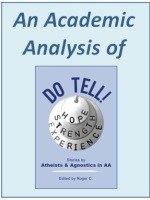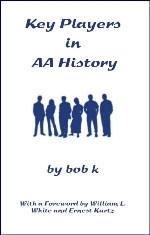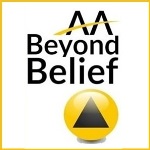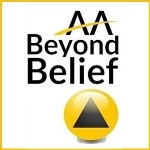Chapter 3
Do Tell! Stories by Atheists and Agnostics in AA
By John S
It’s hard to believe, but it was twenty-six years ago when I attended my first AA meeting, and fortunately I’ve been sober ever since. The circumstances that brought me to AA are far from unique. I was a young man who’s drinking quickly spun out of control. It wasn’t an overnight thing, like one day I could drink normally and the next day I was a hopeless drunk, but looking back I can see there were warning signs.
I remember my first drink as if it were yesterday. In fact, it’s one of my clearest childhood memories. It was Thanksgiving dinner and my mother thought it would be nice to teach me to drink like a gentleman. She poured a glass of wine, which I instantly loved. It was good in every respect, but more importantly it made me feel different, and though I didn’t know it at the time, that was one of my deepest needs, to change the way I felt. I downed the stuff and asked for more. My mother, amused, told me to sip it like a gentleman, but I couldn’t do it. I could never do it.
I drank through High School to overcome my social unease yet it drove me deeper into isolation. I drank in college for fun and acceptance, but even my wild fraternity brothers realized that my drinking was somehow different. At 19, I pondered going to AA, but decided I was too young to be an alcoholic. Today, I know better, and I realize that normal drinkers don’t sit around wondering if they should go to AA. If you have reached that point, in my opinion, for what it’s worth, you may be an alcoholic.
As my drinking got worse, I became increasingly depressed and desperate. I didn’t know anything about religion, but it was the 1980s and televangelism and the Moral Majority were in their heyday. Depressed and hopeless, I watched Pat Robertson on television make incredible claims of what God would do. I read the Bible cover to cover, took a class on the New Testament as literature, and I prayed daily to Jesus for help.
I recall one particular episode of the 700 Club when Pat claimed that if I only had the faith of a mustard seed, that God would answer my prayers. In other episodes, God would cast out demons, cure disease, make people happy, but only if they really believed he would. My understanding was that he, God, would basically do as I asked, as long as I sincerely believed he would.
It was during this period when my mother committed suicide by drug overdose. I was with her, watching her run away from this life. I did my best to believe that God would answer my prayers while the paramedics frantically worked to bring her back. It was useless. I was simply incapable of making a connection with the creator of the universe, so I abandoned the God experiment and for the next five years, I was drunk much of the time. I accumulated three DUIs, and my employer, who previously offered me several avenues of help, was ultimately left with no choice but to fire me.
Alone with my fear and desperation, I was driven to my first AA meeting. It was here where I heard for the first time, “My name is so and so and I’m an alcoholic”. That stunned me when I heard it, but as people told their stories, I could see that they shared with me and I with them, the terrifying experience of losing ourselves to alcohol, losing control of our own lives.
At the end of the meeting they motioned me to the center of the room where they formed a circle, held hands and prayed, “Our father who art in heaven, hallowed be thy name…” It was the first time I ever experienced holding hands and praying out loud with other people, and I remember feeling embarrassed like I wouldn’t want to be seen doing this. It really made me uncomfortable, but I was desperate and when they told me to “keep coming back”, I did. In no time I was praying the “Our Father” as if I were Billy Graham himself.
During the first year or two of sobriety, life was difficult but gradually getting better. I was meeting new friends from all walks of life and making amazing discoveries about myself. There seemed to be more God talk in those days than what I hear now, but it was made palatable with assurances that I could choose my own conception of a higher power. I didn’t have to believe in any religion or anyone else’s conception of God.
Yet, in meetings people would stress the importance of “the drill”, which is to start your day on your knees and ask God for a day of sobriety, go to a meeting, call your sponsor, and at night return to your knees and thank God for the day of sobriety. Often in meetings people would claim they did this drill every day, and that they never knew of a single case of anyone getting drunk, who began the day on their knees in prayer. I would sometimes wonder to myself if this were really true.
I studied our book Alcoholics Anonymous (also known as the Big Book) with my sponsor. I read passages and chapters repeatedly, many to the point of memorization and gradually progressed through the steps. I went on many “twelve step calls” to carry the message of sobriety to the suffering alcoholic. I visited detox centers, hospitals, jails, prisons, and even people’s homes. I saw it all. I experienced alcoholism up close in all its ugliness. I was as the Big Book puts it, “on the firing line”.
Shortly after I reached ten years of sobriety my father unexpectedly died. His death stunned me. He seemed bigger than life, career military, Vietnam combat veteran, fluent in German, and well versed in Shakespeare. Yet it only took three days for some microscopic virus to ultimately bring him down. I saw the fear of death in his eyes, followed by a desperate fight to live, and finally acceptance of his fate. We told one another, “I love you”, and that was it. He was gone.
After he died, I realized there was much that I had not accomplished and time was slipping away. I was thirty-six years old, and still had not graduated from college, never married, never owned a home, and never made much money. I soon went into a mad rush to change all of that. I enrolled in college, started dating, and I found myself spending less time in the AA halls than I had in the past. Within two years, I finished my college degree, bought a home, and had a steady relationship. In another couple of years, I bought my first new car, had a nice job with my own office, and proposed to my wife on the same day that I that earned my MBA degree.

A doctoral dissertation called “Experiences of Atheists and Agnostics in AA” was recently submitted and it is based entirely on the book Do Tell. For more information click on the above image.
I entered a new phase of life where AA was no longer the center of my existence. It was only one part of who I was, and I began to question everything. My wife who I married in 2006 is an atheist and the first atheist that I ever knew very well. She’s not at all like the atheists I heard described by an early sponsor. He would often say that atheists were some of the unhappiest people he ever knew.
Well my wife is one of the happiest people that I’ve ever known. She has a good sense of humor, she loves people, animals, and good books, and she enjoys life to the fullest. Though others around her seem to go through much drama, myself included, she remains amazingly even keeled. And she’s an atheist!
Perhaps influenced by my wife’s example, I read the book God is Not Great, by Christopher Hitchens. I was quite secretive about reading it, and I certainly wouldn’t dream of talking about it with my AA friends. However, that book changed the way I thought about religion, spirituality and AA. I next read Richard Dawkin’s The God Delusion, and I became interested in evolution and the workings of the universe. I found that reality as explained by science was far more beautiful than the best story concocted by any religion.
I had gone past the point of no return and I didn’t want anything to do with spirituality or God. But how was I to work the AA program? Would I ever come clean with my AA friends? Would they still like me? Although AA was no longer the center of my life, it was the cornerstone, it was the bedrock upon which I had built a new life, and I no longer believed or wanted to believe much of what I had been talking about, thinking about, and doing for so many years.
There’s a chapter in the Big Book titled “We Agnostics” where an effort is made to convince agnostics and atheists that belief in a higher power is practical, and that recovery from alcoholism is possible only through a spiritual experience. I used to swallow this chapter hook, line and sinker, but I now see it as totally absurd, and it’s completely against my world view.
When I learned that there are AA groups consisting primarily of atheists, agnostics and freethinkers, I found it strange that they would name their groups after this chapter, but it makes sense to me now. I see it as the atheist alcoholic’s declaration of independence, announcing to the AA community that this chapter leaves us unconvinced. We are still agnostic and still sober.
I started exploring the Internet for more information and my search led me to some people who formed an online community for atheists in AA. I would later meet one of these people, R.J., in Omaha and we had a great time talking about atheism, AA, the Big Book, the future of AA, you name it. I became energized and excited about the program and I still look forward to my weekly meetings with R.J.
Today, I find AA more meaningful when I am free to think about the steps without feeling compelled to conform to the party line. Recovery is real when removing the supernatural aspect. I still find some good in the Big Book and though the language is more than dated, I do think it speaks to the experience of alcoholics, and I believe the AA program works. It’s just that I now find the religious language divisive and unnecessary.
Inspired by R.J. and sites such as AA Agnostica, I helped to start a We Agnostics AA meeting in Kansas City with Jim C., the only other atheist I knew in Kansas City AA. Our group is off to a nice start. We have a comfortable meeting place and a core group of people committed to its success.
I’ve seen people come to our group who were avoiding AA because of the religious nature of other meetings, or who left years ago but returned after learning about our meeting. We support one another and we’re genuinely excited about helping others.
Our experience reminds me of a passage from the Big Book taken from the chapter “A Vision for You” that describes AA as a place where “…you will find release from care, boredom and worry. Your imagination will be fired. Life will mean something at last. The most satisfactory years of your existence lie ahead. Thus we find the fellowship, and so will you”.
Thanks to other agnostics, atheists and freethinkers in AA, this is how I feel about the program today.
![Do Tell! [Front Cover]](https://nrdblogs.nationalrehabdirectory.net/wp-content/uploads/2020/09/Do-Tell-Full-Blue-Front-Cover-200-FRAMED.jpg)
This is a chapter from the book: Do Tell! Stories by Atheists and Agnostics in AA.
The paperback version of Do Tell! is available at Amazon. It is also available via Amazon in Canada and the United Kingdom.
It can be purchased online in all eBook formats, including Kindle, Kobo and Nook and as an iBook for Macs and iPads.
John S, from Kansas City, Missouri, launched the AA Beyond Belief website in 2015 – exactly five years ago – and since then he has hosted close to two hundred podcasts, which features conversations with recovering people who have found a secular path to sobriety in AA. Do Tell! was published on May 12, 2015, a few months before AA Beyond Belief was started.
The post I Lost My Faith and Happily So first appeared on AA Agnostica.





 ):
):



 I grew up as a Jehovah’s Witness and stayed until I was almost 30, about the time I started on my recovery path. I was a good little boy and young adult, studious and well spoken, and I quickly made progress as I reached out for privileges and responsibilities. I had no idea then that so many of those behaviors of people pleasing, finding worth in accomplishments and external accolades, perfectionism, and workaholism were due to growing up in alcoholic dysfunction. My Dad was an alcoholic who left us and the religion when I was little. (He has now been sober for more than 25 years and we have a great relationship.)
I grew up as a Jehovah’s Witness and stayed until I was almost 30, about the time I started on my recovery path. I was a good little boy and young adult, studious and well spoken, and I quickly made progress as I reached out for privileges and responsibilities. I had no idea then that so many of those behaviors of people pleasing, finding worth in accomplishments and external accolades, perfectionism, and workaholism were due to growing up in alcoholic dysfunction. My Dad was an alcoholic who left us and the religion when I was little. (He has now been sober for more than 25 years and we have a great relationship.) Chad Minteer got sober in Twin Falls and Jerome, Idaho. He’s an aspiring writer and part-time blogger, when he’s not doing his day job managing mobile GIS software development for mosquito control field operations. He identifies as a member of Alcoholics Anonymous, but also is at home in Al-Anon, Adult Children of Alcoholics (ACA), and Codependents Anonymous (CODA).
Chad Minteer got sober in Twin Falls and Jerome, Idaho. He’s an aspiring writer and part-time blogger, when he’s not doing his day job managing mobile GIS software development for mosquito control field operations. He identifies as a member of Alcoholics Anonymous, but also is at home in Al-Anon, Adult Children of Alcoholics (ACA), and Codependents Anonymous (CODA).
 David B. Bohl, author of the memoir
David B. Bohl, author of the memoir